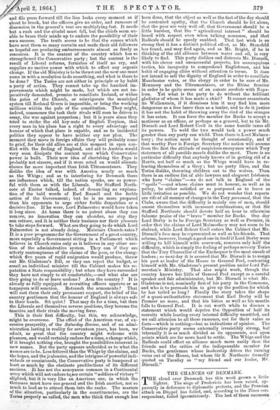THE CHANCES OF DENMARK.
THE cloud over Denmark has this week grown a little lighter. The siege of Fredericia has been raised, ap- parently in deference to diplomatic protests, and the Prussian attack on Diippel has failed, and, according to the Timee cor- respondent, failed ignominiously. The last of these successes sent down the funds, and at first alarmed all true friends of Denmark lest it should change a war for spoliation into one for the honour of Germany and its princes. The kings of the Continent, it should never be forgotten, are primarily not statesmen but soldiers, with uniforms roes of office, and all the prejudices which old general officers who have not seen much service are so apt to entertain. They talk of "military honour" instead of the interests of their subject, care little for statecraft in comparison with victory, and think a successful campaign inglorious unless there has been opportunity for resounding bulletins. The military honour of Frederick the Great was satisfied if Prussia had gained an advantage, for Frederick was general only because victory was then the most effective statesmanship ; but the military honour of the worthy serjeant-major who has succeeded to his inherit- ance requires a heavy butcher's bill. Nothing would have surprised the world less than to hear the repulse of Diippel made an excuse for breaking off negotiations, and military honour pleaded as a full reason for breaking civil faith. A. little reflection, however, has shown the alarmists that the Danish successes, slight as they are, have still been beneficial to their cause. Time, next to Providence the best ally, is on the Danish side. As they fight on, dying by tens in a hopeless struggle against numbers, the enthusiasm of Germany for the Holstein pre- tender passes slowly away; the jealousies of the Kinglets and their little Cabinets rapidly revive ; the jarring interests of Berlin and Vienna, of Protestant and Catholic, of a homo- geneous and a composite nation, begin to clash together once more; and the nationalities are aroused by the cannon to con- sider whether they also have not claims. Another six weeks of ineffective battle, and Italy may be playing honestly in Venetia the part which Germany is playing falsely in Schleswig, Hungary may be voting in arms that her consti- tution shall be preserved, that rich storehouse of explosions the region of the Lower Danube may have taken fire, and Lord Palmerston and Louis Napoleon may have surmounted the " coldness " which is costing the world so' dear. Steel bolts, too, "costing a pound apiece," are articles of which the supply has limits, the King of Prussia will hardly be per- suaded, even by "military honour," to sue to his Parliament for money, and Herr Schmerling reflects with alarm how nearly his Government has approached to the limits of possible taxation. Above all, the campaign is teaching the Schles- wigers the real character of the Governments for whose favour they have been so eager to sell the nationality which has sheltered them so long. They have been accustomed to the freedom which the Danes when most injured have never violated, to go and come at will, to plot whenever plotting secured excitement, to speak as they like, even if they like treason to see their land so well governed that the doors stand opened night, and the very dogs, " never having seen a beggar," are too fearless to keep watch, and they find that they have exchanged all this for Prussian military control, that is, for the most minute and the most stupid of the official tyrannies of the world. Their old freedom of speech is at an end, for if they retained it they might say a kindly word of a Dane, or openly doubt whether God had divided his creatures into angels, Germans, and men ; their old liberty of locomotion is gone, for among ten thousand travellers may not some one count the buttons on a field-marshal's coat, and what would become of Prussia then ? their rights of property are suspended, for what is the use of a harvest if not to feed one's deliverers, and if the soldiers spoil more than they eat, and insult the master, and debauch the maids, why, as that ancient Wrangel Count Tilly said when he pillaged Magdeburg, "The soldier must have some reward for his toils." Their Ministers are driven out, their bank-notes declared illegal, their language, if they are Danes or Frisians, utterly proscribed. They do not like it at all, and in Schleswig, as in the Principalities in 1858, the result of protection may be to make the protectors hate the protected for ever more. There is irony sometimes in events as well as in human speech.
It is a knowledge of this fact, we presume, which has elicited the French proposal to appeal to universal suffrage. England has during the week given a new example of humility without grace, and has consented to a conference "without bases," that is, has thrown over the Treaty of 1852. Consequently the French Government has a right to propose its habitual panacea, and a popular vote expelling Germany from Schleswig would certainly be a delicious termination of the Prussian effort to make a reputation by assaulting a child. The public both in England and Germany will, however, do well to pause before they endorse a proposal which reads so well. s,,y‘we understand the meaning of the dogma of "nationalities" the demand for a vote in Schleswig is a simple perversion of the phrase. That great doctrine does not imply that every fragment of the world which happens to be inhabited by men differing in race from their government has a political right to set up for itself, that the Maltese may appeal to a Congress to assign them a king, or the Biscayans call on Europe to make them a republic, or the people of Alsace summon the- world to deliver them from Napoleon. It asserts the right of nations, not of races, and a nation may be as composite in race as are the people of France, or as various in language as is the population of Hungary, and yet be a unity with rights of special and separate development. Holstein may advance a claim to be a nation as an independent though small State, with a lineage and a history, but Schleswig is no more a State than Wales, and is as much a part of Denmark as Mona is of Great Britain. Its people have a right if oppressed to revolt against Denmark, and if they beat Denmark un- aided their claim to stand alone will be fairly made out ; but to appeal for them to Europe on the mere ground that a certain number wish to assign themselves to Germany is- to disturb the very foundations of the European system. Suppose Lorraine assigns itself back to Germany by a similar process, or Ireland to France, or Savoy to Italy, or Fin- land to Sweden, is Europe to enforce that resolve ? There must be a limit to the power of segregation as well as to that of aggregation, and in the case of a country in which the barest majority is for secession, and that majority has not. an honest grievance except one which falls upon all immi- grants in all lands, and both majority and minority are re- presented in an absolute Parliament, the limit, if it exists, is palpably overstepped. There has been a little too much concession already to this "higher law" of universal suffrage, and if statesmen do not resist in time they may yet witness- popular votes in Belgium, Ireland, and on the Danube, which they must either resist or see great nations perish away. If political rights are worth a straw, and they are becoming very worthless, Denmark has a right to Schleswig so long as she- does not oppress it, and the people do not rebel, and the vote of the populace can no more create a German right than the vote of the Fenians could give the Union a political claim to Ireland. The precedent is the more dangerous because the vote thrown for Germany will be mainly that of immigrants, who as they spread may yet vote Holland, and Hungary, and Poland parts of United Germany. It- may be that for the moment a violent wrong is to triumph, and Germany tear a province from a feebler but freer people ; but let us at least be no party to devices intended to- consecrate that great wrong. Better Denmark should acknowledge at once that the force applied is irresistible that her allies are too timid to help, her population too thin to resist, and so submit to the pirate without by her own act. legalizing the piracy. The Danish Government, however, has not as yet accepted the Conference without bases, and if it is wise will refuse to throw its dominion into any- Medea's cauldron of the kind. Let it release Holstein at. once, remove the last vestige of oppression from the laws of Schleswig, and fight on, confident that aid always comes at- last to men who are willing to die for their right,—that time, if it makes the victim no stronger, always at least tires out. theexecutioner.



































 Previous page
Previous page